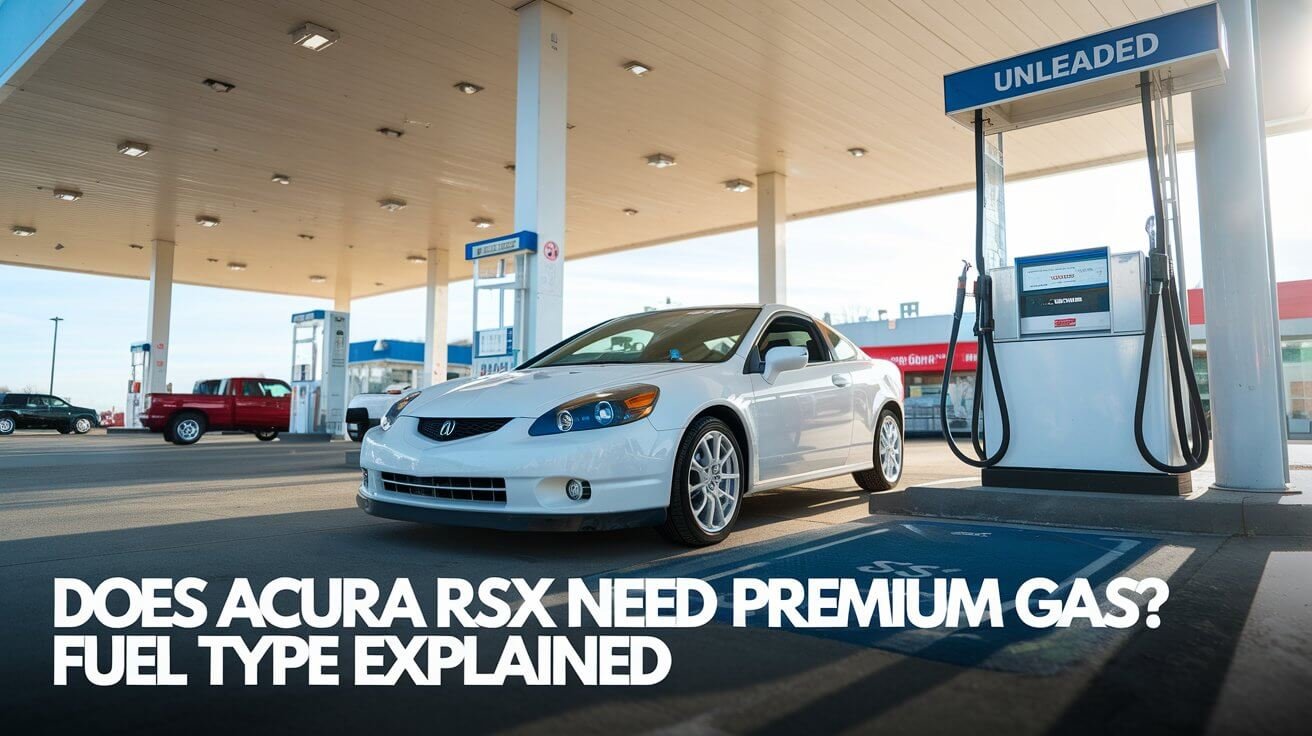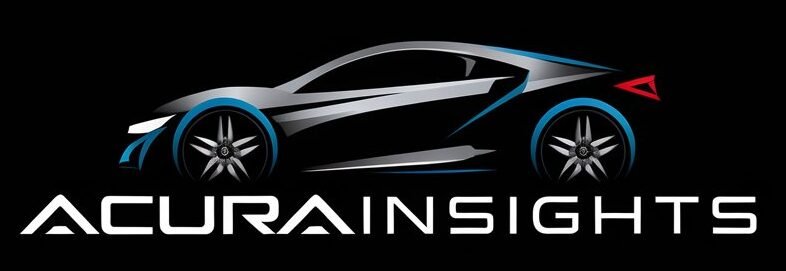Does Acura Rsx Need Premium Gas: Fuel Type Explained

As owners of the Acura RSX base model, we’ve often wondered if premium gasoline is essential. The owner’s manual suggests using 86 octane or higher. However, there’s a debate about whether premium gas is truly necessary for the RSX’s VTEC engine. Let’s delve into the fuel requirements for the Acura RSX base model.
Factory Fuel Requirements for Acura RSX Base Model
Refueling your Acura RSX base model requires adherence to the manufacturer’s guidelines. The owner’s manual specifies that the base model should use 86 octane or higher gasoline. This contrasts with the high-performance Acura RSX Type-S, which necessitates premium 91 octane fuel for peak performance and engine safeguarding.
Manual Specifications and Manufacturer Guidelines
The Acura RSX base model comes with a 2.0-liter, i-VTEC 4-cylinder engine. It generates 160 horsepower at 6,500 rpm and 141 lb-ft of torque at 4,000 rpm. Its 9.8:1 compression ratio allows it to efficiently operate on regular unleaded gasoline. In contrast, the RSX Type-S model, with its 11.0:1 compression ratio, requires premium fuel.
Minimum Octane Rating for Base Models
The owner’s manual advises using 86 octane or higher gasoline for the RSX base model. This minimum octane rating ensures the engine operates optimally. It strikes a balance between performance, fuel efficiency, and engine longevity.
Differences Between Base and Type-S Requirements
While the base model RSX can run on regular gasoline, the Type-S variant demands premium 91 octane fuel. The Type-S engine’s higher compression ratio and increased power output require the higher octane rating. This prevents knocking or pre-ignition, which can cause engine damage over time.
Premium vs Regular Gas Impact on RSX Performance
The Acura RSX’s manufacturer recommends premium gasoline for peak performance and engine safety. Some owners might consider regular fuel to cut costs, but the Acura RSX performance enhancements could be affected.
Our study shows premium fuel in a base RSX model might not significantly boost performance. Some users report a slight fuel economy increase with premium fuel. Yet, others see no difference. The RSX’s engine is built to efficiently use regular gas, making premium fuel’s extra cost questionable.
| Fuel Type | City MPG | Highway MPG | Combined MPG | Avg. Tank Range (km) |
|---|---|---|---|---|
| Regular | 21 | 28 | 24 | 430-450 |
| Premium | 21 | 28 | 24 | 450-480 |
The performance gap between regular and premium fuel in a base RSX seems small. Yet, the Acura RSX Type-S models, with their advanced engine, might see more benefits from premium fuel. This ensures they run smoothly and avoid engine knocking.
Does Acura Rsx Need Premium Gas
The Acura RSX, a favorite among sports car enthusiasts, has ignited a debate about its fuel requirements. Opinions vary, and personal experiences are shared widely. It’s essential to delve into the specifics of what the Acura RSX needs in terms of fuel.
Effects of Different Octane Ratings
Higher octane fuels, like premium gas, help prevent engine knocking. This is crucial for engines with high compression. Yet, the Acura RSX’s base engine runs smoothly on regular 87-octane gasoline. Some owners have tried mid-grade 89-octane fuel for better performance. However, sticking to the manufacturer’s advice is always best.
Engine Response to Fuel Grades
Many Acura RSX owners have noted that the engine’s response to different fuels is subtle. Premium fuel might offer a slight edge in performance. Yet, the cost savings of using regular gas often outweigh these minor gains. Always refer to the owner’s manual for the best fuel choice for your Acura RSX.
The Acura RSX doesn’t necessarily need premium gas, especially for the base model. It’s designed to run well on regular 87-octane fuel. Following the manufacturer’s guidelines and considering the price difference between regular and premium gas can help you make a cost-effective choice without sacrificing performance.
Fuel Economy and Octane Rating Correlation
The Acura RSX’s fuel economy can change with the octane rating of the gasoline. Some owners have seen better gas mileage by switching to premium fuel. They report increases from 29-30 mpg to 34-35 mpg in mixed driving. Yet, these gains might not justify the higher cost of premium gas for everyone. Results can differ based on driving habits and conditions.
Research shows that for normally aspirated engines like the Acura RSX, regular gas has a small impact. There’s a 1-3% loss of horsepower and no noticeable difference in fuel economy. This is because regular and premium gasoline have similar energy content. The compounds used to increase octane rating bring their energy levels to a comparable point.
| Fuel Type | Fuel Cost in The Woodlands, TX | Fuel Cost in Stockholm, Sweden |
|---|---|---|
| Regular | $3.50 | $8.15 |
| Premium | $3.90 | $8.75 |
The cost of premium gas can be over 10% higher than regular, as seen in The Woodlands, TX and Stockholm, Sweden. This price difference is a key factor for Acura RSX owners when weighing the fuel economy benefits of premium gasoline.
Choosing between premium or regular fuel for an Acura RSX should balance performance, fuel economy, and cost. The impact can vary based on individual driving habits and conditions.
VTEC Engine and Fuel Grade Compatibility
Understanding the connection between the Acura RSX’s VTEC engine and fuel grade is crucial. Many believe VTEC engines require premium gasoline. However, the base model RSX can run efficiently on regular fuel.
Compression Ratio Considerations
The engine’s compression ratio is vital in choosing the right fuel. The RSX base model’s ratio is suitable for regular gasoline, typically around 10.5:1 or lower. This ratio ensures optimal performance without the need for premium fuel, saving owners money.
Engine Protection Factors
Using the recommended octane rating is key for engine performance and longevity. Regular fuel with the correct octane prevents knocking or pinging, which can harm engine components. Following the manufacturer’s fuel recommendations helps Acura RSX owners maximize engine protection and avoid unnecessary expenses.
Quick Answers
Does the Acura RSX need premium gas?
The Acura RSX base model does not necessarily need premium gas. The owner’s manual states that 86 octane or higher gasoline is suitable for the vehicle’s engine.
What are the fuel requirements for the Acura RSX base model?
The Acura RSX base model’s owner’s manual recommends using 86 octane or higher gasoline. This is different from the Type-S model, which requires premium fuel due to its higher compression ratio.
Is there a difference in fuel requirements between the Acura RSX base and Type-S models?
Yes, the Acura RSX Type-S model requires premium fuel, while the base model can run on regular 86 octane or higher gasoline. The base model’s lower compression ratio allows for the use of regular gas without issues.
How does using premium gas affect the performance of the Acura RSX base model?
Using premium gas in an Acura RSX base model may not provide significant performance benefits. Some owners report slightly improved fuel economy, while others notice no difference. The vehicle’s engine is designed to run efficiently on regular gas.
How does the fuel economy of the Acura RSX vary with different octane ratings?
Fuel economy in the Acura RSX can vary based on the octane rating used. Some owners report improved gas mileage with premium fuel, citing increases from 29-30 mpg to 34-35 mpg in mixed driving conditions. However, these improvements may not offset the higher cost of premium gas for all drivers.
Is the VTEC engine in the Acura RSX compatible with regular gasoline?
Yes, the VTEC engine in the Acura RSX base model is designed to operate efficiently on regular gasoline. The engine’s compression ratio is the key factor in determining the fuel requirements, and the base RSX’s engine is designed to run on regular 86 octane or higher without issues.
